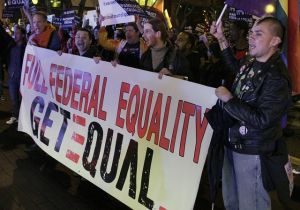U.S. Supreme Court has no power to rule on same-sex marriage case: brief

The U.S. Supreme Court does have the power to rule on the constitutionality of a federal law defining marriage as between a man and a woman, a Harvard law professor argued in a brief filed Thursday.
Constitutional law expert Vicki Jackson said the justices do not have legal grounds to decide the merits of a case challenging the constitutionality of Article 3 under the 1996 Defense of Marriage Act (DOMA), which bars federal benefits for same-sex marriages. The Court is not in a position to rule in the case of United States v. Windsor because the White House and Justice Department agree with a federal appeals court ruling striking down the statute last year.
"The United States' agreement with the courts below deprives this Court of jurisdiction, because the United States suffers no injury sufficient to invoke Article III jurisdiction," contended Jackson in her amicus brief. " An interest in obtaining a ruling from a higher court does not create standing."
Jackson also argued that House Republications do not have legal standing to defense DOMA, saying they do not speak for Congress or the House.
The Supreme Court agreed last month to take up the challenge to DOMA. In early 2012, a New York court ruled DOMA unconstitutional, saying married same-sex couples should not be denied the same federal benefits as straight couples.
The nation's highest court is also set to review California's Proposition 8, a 2008 voter referendum that defined marriage as between one man and one woman, thereby banning same-sex marriage. A lower court struck down the ban as unconstitutional. In that case, the Court posed the question of whether the sponsors of the Prop. 8 ballot measure had "standing" to appeal under Article 3 when the governor and attorney general have refused.
The Supreme Court will hear arguments in the Prop. 8 case on March 26, and in the DOMA challenge the day after.